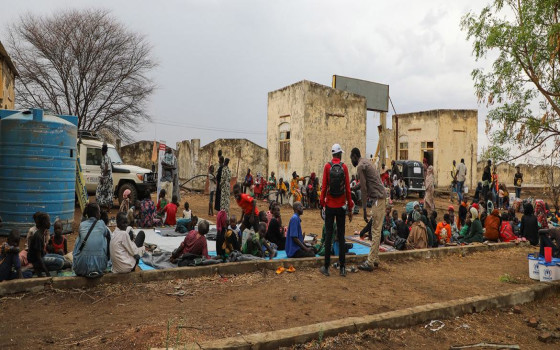
300 days of atrocities against Sudanese children - and UNICEF calls on the world not to abandon them...a war that destroys a country and the future of an entire generation

- Europe and Arabs
- Saturday , 10 February 2024 14:8 PM GMT
Geneva - Khartoum: Europe and the Arabs
UNICEF called on the world not to turn a blind eye to the tragedy of Sudanese children, which has now become the largest child displacement crisis in the world, three hundred days after the war that broke out in April last year, and caused a wave of atrocities against Sudanese children. According to what was stated in United Nations news bulletin, a copy of which we received on Saturday morning
UNICEF spokesman James Elder spoke to reporters in Geneva yesterday, Friday, following a recent visit to Chad and Darfur during which he met with refugee and displaced families.
Elder reported that four million Sudanese children have been displaced - that is, 13,000 children every day for 300 days, noting that hope has faded, people have lost safety and property, while friends and family members have been separated from each other or gone missing.
The most dangerous type of malnutrition
James Elder pointed out that more than 700,000 children are likely to suffer from the most serious forms of malnutrition this year. “We will not be able to treat more than 300,000 of them without improved access and additional support. Tens of thousands will likely die.”
He also pointed out that cases of murder, sexual violence, and recruitment have increased five-fold compared to a year ago. “This equates to horrific numbers of children who have been killed, raped or recruited. These numbers are just the tip of the iceberg.”
A war destroys a country and the future of an entire generation
A UNICEF spokesman says that two-thirds of the population currently lacks health care. He added:
“This is a war that is destroying health and nutrition systems, and it is killing people. This is a war that is destroying the concept of respecting the laws of war, which is killing people. It is a war that is destroying the ability of families to feed and protect themselves. It is a war that is destroying opportunities, it is destroying a country and the future of an entire generation.”
James Elder warned that the true cost of the war is not measured only by the number of victims, but also by the loss of intellectual capital, “and this war risks dooming Sudan to a future devoid of learning, innovation, progress, and hope.”
Painful stories from Darfur and Chad
James Elder said that the last time he visited Darfur was 20 years ago, noting that his recent return was a "déjà vu" of a bloodier kind. As for the children of Darfur, and the young people who were once children in Darfur, it was even worse. He added:
“When I returned to Darfur last week - I heard stories of deaths from nutrition and deaths from violence - I also met countless young people in their 20s whose dreams had died. These young people were little children during the massacres in Darfur 20 years ago. And in a way "What, their families kept them safe in the midst of this horror. They have clinging to life for the past 20 years."
He said that the young people he met - whether in Darfur or Chad - had studied or were studying economics, medical sciences, engineering and information technology. However, in the chaos of this war, the brightest minds were forced to abandon studies, and their ambitions faded, he said.
“I used to dream of studying medical sciences,” said 22-year-old Hadia in Darfur. “I was living that dream. Now I have nothing. I stopped dreaming. Sadness has become my friend.”
As for Ahmed, 20, who now lives in the Farchana camp in Chad: “I cannot dream here.”
How can I get out of this nightmare?
James Elder then asked how we could get out of this nightmare and reawaken the dreams of young people, pointing out that this requires those in power to negotiate a ceasefire and ensure that aid is not withheld. “Those in the region must show leadership. Those living in donor countries must show compassion and humanity.”
In the absence of any sign of a ceasefire, James Elder stressed that we must focus on two things:
First, safe, sustainable and unimpeded humanitarian access across conflict lines and across borders;
Second, provide international support to help maintain the basic services that children depend on to survive. “Right now we don't have either.”
UNICEF is appealing for US$840 million to reach 7.6 million of the most vulnerable children in Sudan with humanitarian assistance during 2024.
James Elder said that despite the scale of the needs, the funding that UNICEF sought last year for about three-quarters of children was not affordable. He added:
“Amidst so many children being ignored, it is important to remember what families and communities do: most health workers in Sudan have not received a single wage since the war began. But they come to work to help their communities in Sudan. Communities in Chad share- Which already suffers from a severe shortage of food and water - what can it do with the refugees?
He pointed out that people use all their strength and resilience to survive and support their communities. He added:
However, the people of Sudan increasingly feel abandoned by the world. When it comes to Sudan's children and youth, the world needs to stop turning a blind eye. Where is our collective humanity if we allow this situation to continue?












No Comments Found